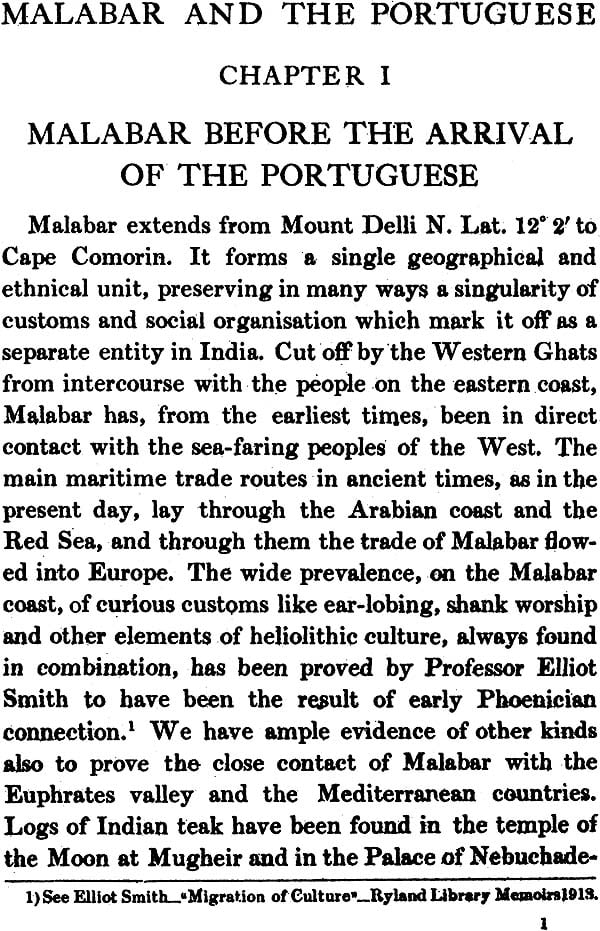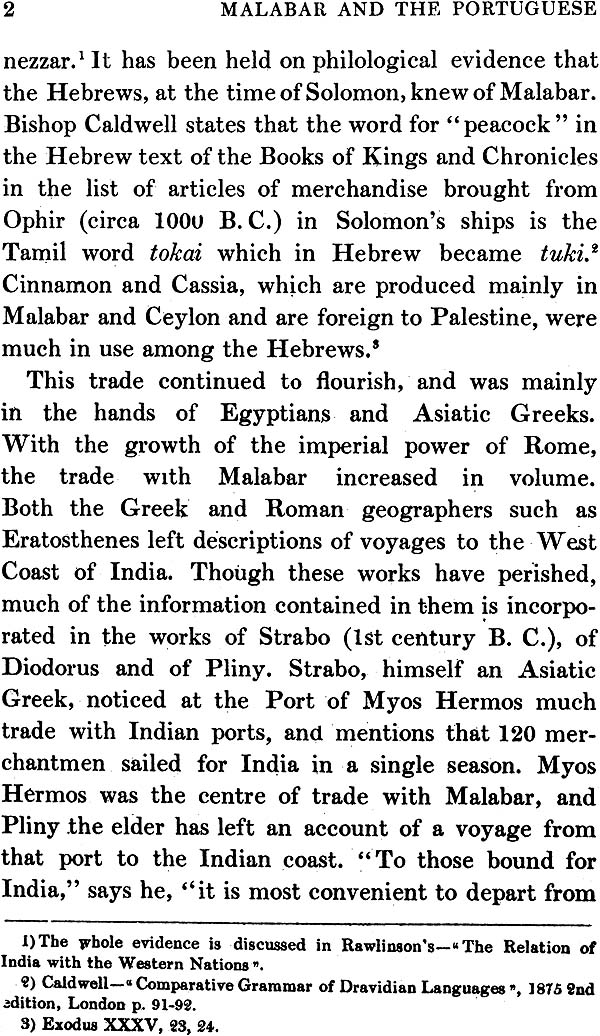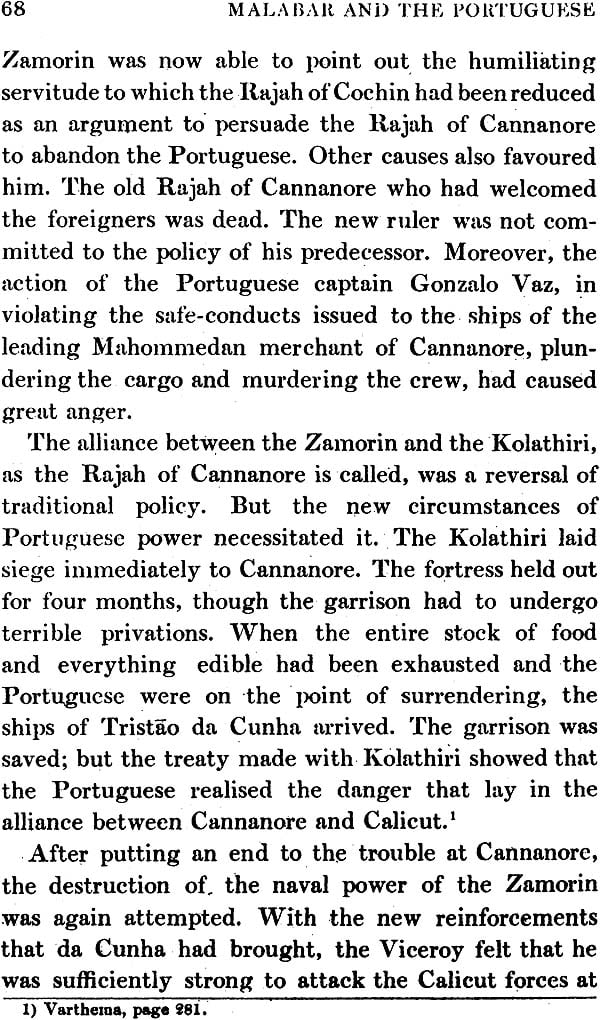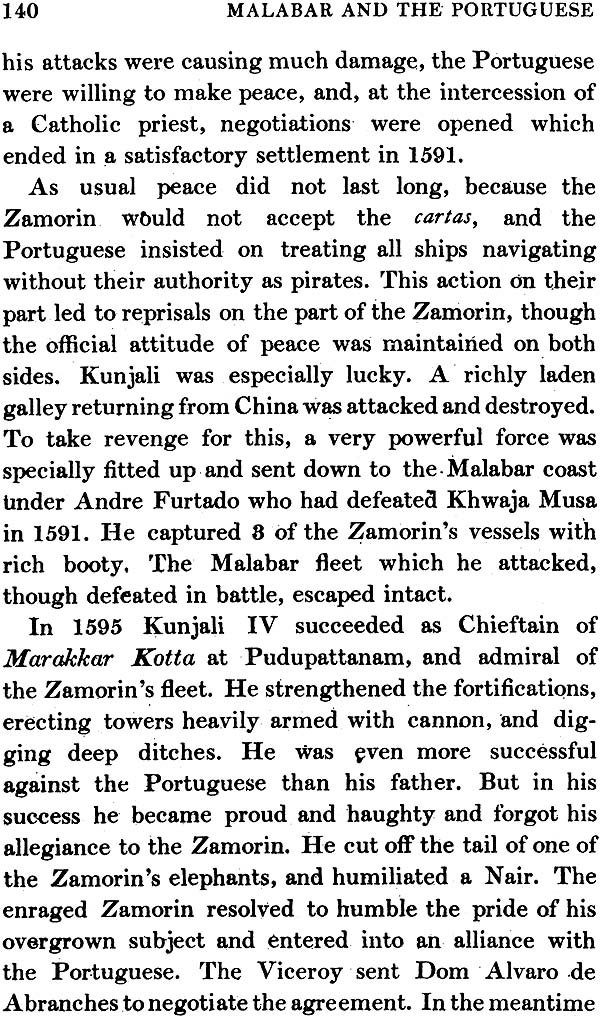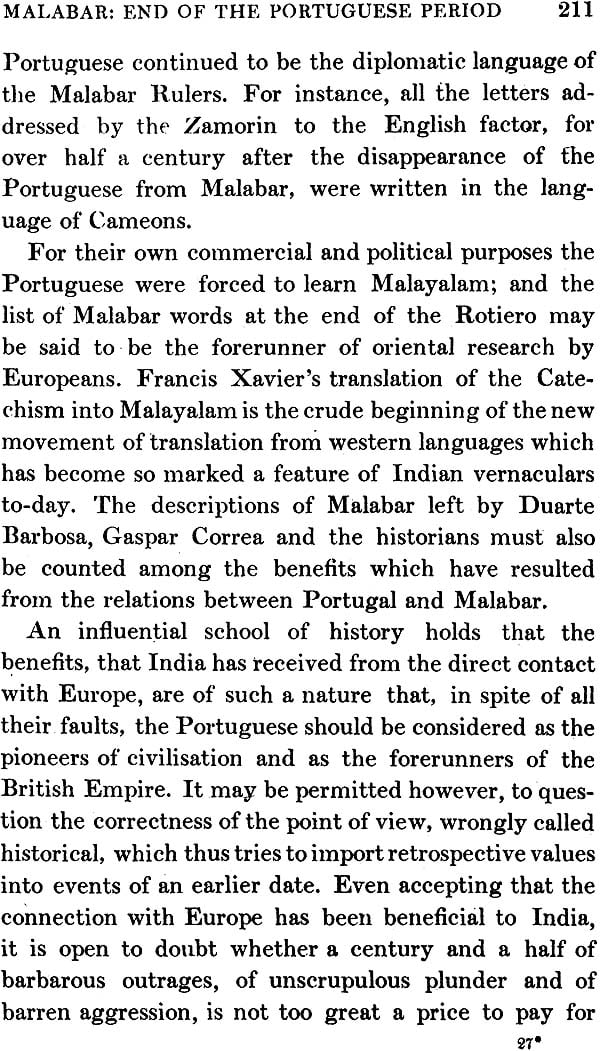
Malabar and The Portuguese
Book Specification
| Item Code: | NAN024 |
| Author: | K. M. Panikkar |
| Publisher: | Voice of India New Delhi |
| Edition: | 2016 |
| ISBN: | 9788185990439 |
| Pages: | 234 |
| Cover: | Paperback |
| Other Details | 8.5 inch x 5.5 inch |
| Weight | 330 gm |
Book Description
K. M. Panikkar (1895-1963) became well known as a distinguished administrator and diplomat. But the field in which he really excelled was history. His best work, Asia and Western Dominance, was published in 1953, and reised a great uproar in Christian missionary circles, particularly in India. He had documented the role of Christian missions as accomplices of Western imperialism. His Malabar And the Portuguese, published in 1929, was a prolegomenon to what came twenty- four years later.
The Portuguese came to India with a Cross in the one hand and sword in the other. King Joao III (1557-1578) was particularly anxious about the spread of Christianity and wrote to the Viceroy Joao de Castro demanding that all the power of the Portuguese should be directed to this purpose. “The great concernment which lies upon Christian princes to look to matters of Faith and to employ their forces for its preservation makes me advise you how sensible I am that not only in many parts of India under our subjection but in our city of Goa, idols are worshipped, places in which our Faith may be more reasonably expected to flourish; and being well informed with how much liberty they celebrated heathenish festivals. We command you to discover by diligent officers all the idols and to demolish and break them up in pieces where they are found, proclaiming severe punishments against any one who shall dare to work, cast, make in sculpture, engrave, paint or bring to light any figure of an idol in metal, brass, wood, plaster or any other matter, or bring them from other places; and against who publicly or privately celebrated any of their sports, keep by them any heathenish frankincense or assist and hide the Brahmins, the sworn enemies of the Christian profession… It is our pleasure that you punish them with that severity of the law without admitting any appeal or dispensation in the least”.
The Christians of the Syrian Church had been treated generously by Hindu Rulers who had allowed them to live without molestation or interference. They lived in religious matters under their own Metrans. And yet, though the Hindu Rulers had treated them like this, at the very first opportunity, they hastened to disclaim their allegiance and to accept the sovereignty of the King of Portugal. Even accepting that the connection with Europe has been beneficial to India, it is open to doubt whether a century and a half of barbarous outrages, of unscrupulous plunder and of barren aggression, is not too great a price to pay for the doubtful benefits of having the way opened for other European traders. India’s own direct trade was ruined, and , in its place, there was established a monopoly by alien races, which had the effect of draining the wealth of India into Europe. The Portuguese of the 16th and the 17th centuries had nothing to teach the People of India except improved methods of killing people in war and the narrow feeling of bigotry in religion.
Mr. Panikkar has performed a work 01 value to students in providing a summary of the history of the Portuguese in Malabar. He has, however, thus confined himself to a portion only of their doings in the East, rigorously moreover keeping to this theme, and the chief value of his observations to my mind is that he gives the history from the point of view of the Indian who has been trained in historical research and is capable of bringing out the essentials of the story he has to tell. It is not a pleasant tale, but that is not his fault-rather that of his subject.
He begins by showing how it was possible for the Portuguese to accomplish what they managed to do, as, when Vasco da Gama reached the Malabar Coast the country was split up into petty principalities over whom no one had any real authority not even the Zamorin of Calicut. So it did not require any particular political insight to playoff the princelings along the coast against each other and establish foreign authority over small isolated coastwise areas. Mr. Panikkar has no high opinion of Vasco da Gama and does not class him with the great European explorers. Perhaps he is somewhat hard on him; but, no doubt, Vasco da Gama was not a “great" man in the sense that others of his time and later on were. Mr. Panikkar has indeed but little opinion of any of the Portuguese leaders excepting Albuquerque, Duarte Pacheco as a military luminary, and Affonso Mexia as a financier; and, indeed, these men did some wonderful things, considering the difficulties that surrounded them. He is right also in stating clearly that the Portuguese never had any power or Empire in India, that they never got beyond acquiring a little local authority, strictly confined to small areas around the forts they built along the coast line. Yet, with the fortuitous assistance of general politics in the Near East, and not of their own superior skill, they achieved for a long period their chief object- the destruction of the Egyptian and Venetian trade with the East, and the concentration of it in their own hands on the sea. Some of their Governors saw that it was in sea power only that their chances of success and greatness lay.
In judging of the Portuguese and their actions in India, one has to recollect that they were a century nearer feudal Europe than were any of the other nations that invaded the country-a century further back in civilisation and political organisation. In fact, they had very little of the latter, as practically every Factor had a right to address the Portuguese Crown direct and write home what he thought fit-truth or untruth, praise or slander-of the Viceroy, Governor or other superior authority. Authoritative government is impossible under such conditions, and so the Portuguese officials made it. They destroyed even Albuquerque in the end. One wonders indeed that anything at all was accomplished; and the undoubted fact that trade and civilisation did flourish under them for a time supplies yet another Instance, of many in history, of the truth of the dictum that human beings act better than they organise.
In their medievalism there was little .to choose between the higher Portuguese officials and their Indian contemporaries. The insincerity, dishonesty, selfishness, chicanery and cruelty were about on a par, though perhaps, the cruelty of the Portuguese was the greater, and indeed commercial and political intercourse must have been difficult when .no man's word was to be trusted on either side. Yet, as aforesaid, they did manage to carry on commerce and the dealings of everyday life. The public proceedings of the Portuguese leaders, great and small, were essentially those of a mediaeval people. There was little attempt at straight dealing. It was everyone for himself from the Viceroy downwards, and every kind of official entered into private trade. The strong succeeded in their personal aims; the weak brought disaster on themselves and their following, while; as among all such people, there were individuals who were sufficiently wide- awake to their own interests. Life struggled on; wealth was accumulated in places; extravagant careers were lived through: great houses and towns were built: and there was much show of success. But the whole structure was hollow, and fell before the first equally well-equipped enemy that attacked it. The hollowness was not the result only of the action of the representatives of the Portuguese nation in India. The home government was necessarily ignorant of the conditions, and, as has been already hinted, took the wrong course in ascertaining the truth as to the proceedings of its, agents in the East. The entire system showed its inefficiency from the very top Otherwise such men as Cabral, de Coutinho, Reall, de Meneses, de Sousa and others like them, would not have been sent to high office. The position in India was thus rendered hopeless. Officials were improperly paid, or even not paid at all; the very soldiers were unpaid for a year after arrival in any case; pay counted for little, and perquisites were everything; at first, there was no accounting, and even after it was instituted it was very bad-as a matter of course the currency was soon debased; indeed, selfishness and shortsightedness at home seem to have been endless. At any rate, they led to sending orphan .girls to India with appointments- even high ones-as dowries to any husband they might marry on arrival. If such things had not actually happened, one could hardly credit their possibility.
It must not, however, be supposed that no Portuguese showed any of the higher human capacities. The records of Barbosa and Correa, among others, are proof of the contrary. Albuquerque was, a real administrator; Duarte Pacheco had considerable military genius, and Alfonso Mexia true financial ability as well as honesty of purpose. There were besides, even in the beginning, men who understood; but they were not in supreme power.
There were also men who learnt much-more in fact than for a long time did the more successful of the' Europeans who followed them to 'India-of the natives of the country, their tribes,' their habits and their religious ideas. An unfortunately bigoted' and far too powerful a priesthood led the Portuguese Church in India; but even amongst them there were such true missionaries as Francisco de Xavier. The want of principle, however, in the government and organisation made the situation hopeless Ignorance in regard to the Indians and their ways was at first complete-so complete indeed that Vasco da Gama and his men, at the beginning thought that the Hindu was a kind of Christian. The Mahommedan the Moor-they knew and hated with a true religious fervour, but Hinduism in any form was a thing unleashed. They soon learnt better; but it will be understood that mistakes were necessarily many, especially as the bigotry never diminished.
Among the mistakes, perhaps the most serious, were that the country could be taken by force, that conversion to the Portuguese form of Christianity of all the Indian population was a feasible proposition, and that the princelings with whom they came in contact were the Princes of India. The pride and self-conceit of the Portuguese, too, were unlimited. They looked on themselves as the salt of the earth, all others being completely below them; and yet they had no repugnance to a mixture of races. Their inferiority in numbers was obvious, and, from the beginning, they sought to set it straight by mixed unions, Portuguese and Indians, not realising that the population resulting would be neither Portuguese nor Indian. The mixture of races thus permitted was Carried very far and permeated every class. It unquestionably helped in the fall of the Portuguese as a race in India. At the same time the mixing of European and Indian soldiers and sailors led the way to a most successful organisation; afterwards adopted with a difference by the French and English.
A -consideration, like the above, of the conditions of Portuguese power in India, such as it was, explains true tales of the times that otherwise read as pure romances, and there are many such. Take for example the career of Dom Martin (1606-1648). The King of Arakan had a son who was Viceroy of Chittagong, while the Portuguese piratical adventurer, Sebastian Gonsalves, constituted himself Ruler of the island of Sarandip. The Arakanese Viceroy felt himself uncertain in his post and. made overtures to Gonsalves, who seized the opportunity to better his own position. In the result, a daughter of the Arakanese Viceroy, born of course a Buddhist was married, al a Christian, to the Portuguese pirate's son. The proceeding was naturally not pleasing to the King of Arakan, who sent his eldest son to deal with the Viceroy. This eldest son was afterwards a notable King of Arakan and his visit to Chittagong was the end of his brother, the Viceroy, and incidentally, in the sequel, of Gonsalves also. But the Portuguese priest managed to spirit away two of the Viceroy’s children, a boy and a girl, to Hooghly, where they were brought up as Portuguese Christians under the names of Dom Martin and Dona Petronells. It was in accordance with Portuguese manners and polley to treat Dom Martin the Arakanese as a Portuguese gentleman of standing. He, accordingly, served for years as an officers in the Army and Navy in India, and, as it happened, with distinction. Meanwhile his uncle, the King of Arakan, died and his successor was overthrown by a usurper. Portugal also, under John IV, had recently thrown off the Spanish yoke and Dom Martin saw his Chance to recover his own throne through Portuguese help. SO he managed to get to Portugal, as the first romance itself. He obtained an interview with John IV who found him a man of parts and could symbothise with him in his desire to recover his heritage. At any rate, the King equipped an expedition for him, and then, unfortunately, Dom Martin died at sea without even reaching India. So ended, in nothing, an extraordinary romantic career, which might otherwise have seriously affected Burmese history. But the point, in the present connection, is that it was made possible by the conditions of the Portuguese occupation of the Indian coasts. Dom Martin could not have attained the position he achieved under any other European power in India.
Another story of the period, which reads impossible to the modern Englishman, also illustrates the conditions of Portuguese presence in India during the early part of the seventeenth century. Felippe de Brito, a cabin boy and palace mental, rose in three years (1600-1602), during the chaos on the callapse of the Peguan Empire, to the Governorship of Syriam, near Rangoon for the Arakanese, and finally to the throne of Pegu itself, with a daughter of the Viceroy of Goa for wife. Like other Portuguese of the time, he was an aggressive, headstrong man, with on idea in ingratiating himself to his people or neighbours. So in 1613 he was ousted and impaled alive, while his unfortunate queen, who seems to have been a typically proud Portuguese women, was sent as a slave to Ava. Here again we can see that it was the condition of Portuguese administration in India and the East that made such a story possible. There are other equally astonishing.
The mention of Sebastian Gonsalves, who may be looked on as a real pirate, induces me to remark on what is usually called piracy in the Indian seas in the sixteenth and seventeenth centuries. The Portuguese admitted the right of other European nations to the freedom of the Western oceans, but claimed, under Papal authority, to be the only lawful sailors on those in the East. Under such a claim, sailors of all other nations, using them without Portuguese permission, were pirates. This is why the Kanjali Marakkars were looked on as such, through they were in reality the admirals of the Zomorin of Calicut. They fought the Portuguese with varying success for a hundred years until they became overgrown subjects of their nominal master and were destroyed by the Portuguese through his connivance. So was every “Moor”, and the commander of every ship of another European nation sailing in the East, a pirate in Portuguese eyes. In one sense indeed every ship, Portuguese or other, capable of fighting, as were most of the large vessels in the Eastern seas, was in those days a pirate craft.
Although the Portuguese invasion of the Indian coastal regions was, in the light of the above observation, only an incident in the general history of the country, it had profound effect on Malabar. The tendency of the rule of the native princelings was towards a consolidation of power in one of them, the Zamorin of Calicut, and there can be little doubt but that something of the kind would have been the fate of Malabar had it not been for the disruptive effect of the intervention of the Portuguese. Their action prevented any such event taking place, and after the fall of their influence nothing of the kind was possible. In fact, the present condition of Malabar under British rule is largely the result of Portuguese action. Again, as has been remarked above, however badly the Portuguese ruled the people went their own way in domestic and commercial life and did an immense amount of good to country by introducing new products, such as the cashew (kishu) nut and tobacco. They also vastly improved the spices and fruits for which Malabar was already famous. Especially was their work beneficial to the cultivation of the cocoanut; and they may be said to have created the great modern trade in coir. So, although there is much to be said against the Portuguese doings in South India, it cannot be truthfully asserted that they produced no good at all.
For the study of Portuguese relations with Malabar there is available in India, England and in Portugal, a very large mass of material. It consists mainly of large collection of State papers, official despatches and other correspondence, descriptive narratives, besides records of a more personal character like the “Commentaries" of Albuquerque and the biography of de Castro. Neither is there any lack of “histories," for the Portuguese writers of those days were not forgetful of the duty of singing the glory of their fatherland. In India also, there is a considerable quantity of highly valuable material, mostly in the form of Chronicles in the Malabar temples and royal families.
A thorough examination of the documents and papers relating to India, preserved in the various libraries and archives of Portugal, was made by Mr. Danvers of the India Office Library. He also secured for the India Office translations and transcripts of the most important of these. As a result, the India Office Library now possesses a unique collection of Portuguese manuscripts. Their value would have indeed been greater if the translation bad been undertaken by someone who had a better knowledge of English than the Portuguese scribe to whom the task was entrusted. As it stands, it is often difficult to make sense out of whole passages, and often it is easier to consult the original than to go to the translation. The following are the chief collections and unpublished books available at the India Office.
I. The Corpo Chronologico. Transcripts 2 vols. These are translated. They consist mostly of letters addressed by Governors and other officials to the Kina and sometimes to important court dignitaries in Lisbon. This collection is of the utmost importance.
II. Gavetas Antigas. Translations 2 vols.
III. Translations as well as transcripts from the Cathedral library at Evora and the letters from Viceroys which are presented in the Torre de Tombo.
IV. Noticias da India. 2 vols, This is a very interesting, though often undependable, collection of descriptions of forts and places of historical interest.
V. Biker's collection of Treaties and Engagements with Indian Rulers. Two volumes are translated.
VI. The Cartas of Albuquerque. 4 volumes are translated. At the Torre de Tombo and the National Library of Lisbon there .are many valuable documents not yet available in England. Through the courtesy of Dr. Antonio Baio I was enabled to examine a good many ; Unfortunately, though the material relating to India is vast, Malabar finds but little mention after the time of Albuquerque. The "Documentos remittidos da India," which is a monumental series of 62 volumes covering no less than 12,465 documents, hardly touch Malabar. It covers the period between 1600 and 1697. For our purpose the most important collection is the Corpo Chronologico. It is on this I have had mainly to depend.
In the British Museum there is an excellent collection of Portuguese MSS. besides a number of interesting portraits.
The Portuguese Academy has been for considerable time actively assisting in the publication of important documents and books relating to India. The most important publication of the Academy in this connection is the Colleccao de Monumentos ineditos para a historia das conquistas dos Portuguezes em Africa Asia e America. The Annres das sciencias e letteras have also published some very important documents which were until then unknown.
Portuguese histories relating to India are numerous. The most important of them are the following:
(1) Joas de Barroes, whose official connection with the India Office in Lisbon gives his work, which is practically a contemporaneous record, an .authority which few others possess
(2) Gaspar Correa. Lendas da India. This book also is of special importance. Correa went to India in 1512. He acted as Albuquerque's secretary and the events he describes were therefore known to him personally or related to him by those who bad taken part hi them. With regard to the first voyage of Vasco da Gama he had the benefit of using a diary which Joam Figuera,
who accompanied the Captain-General in that expedition, had kept. His Lendas, it is curious to note, remained unknown till 1790, and was published only in 1886.
"I laboured," says he, "with much care on the events I saw and those which had gone before enquiring of the older men who had been of this discovery and removing my doubts by means of the same men who had been present at the events: in the course of which I found some men who had come in the very ships of discovery. Also by means of some memoirs which I found in the possession of Moors and Gentiles, especially in Cannanore who wrote with surprise at seeing what they had never imagined.”
The Chapters relating to the voyages of Vasco da Gama in this book have been translated by the Hon. H. E. Stanley for the Hakluyt Society (1869).
Other histories like the works of Diogo de Couto and Castenheda, valuable though they are, do not devote much space to Malabar affairs.
Besides these volumes which are of primary importance, I have used the following books:
I. Andrade, J. F. Life of Dom John de Castro. translated into English by Sir Peter Wyche, 1664.
II. Barbosa, Duarte. Hakluyt Society, 1866.
III. Caldwell. Comparative Grammar of Dravidian Languages. 2nd edition, 1875.
IV. D' Albuquerque. Commentaries translated and published by the Hakluyt Society.
V. Danvers. Portuguese in India. W. H. Allen, 1894, 2 volumes
VI. Da Orta. Colloquies- Lisbon. 1895. Edited by the Conde de Ficalho, English translation by Sir C. Markham, London, MCM XIII.
VII. Ficalho, the Conde de. Garcia da Orta e sua Tempo Impresna Nacional.
VIII. Logan. Malabar. 2 volumes. Madras, 1887.
IX. Menon. History of Kerala. Ernakulam, Cochin Government Press, 1925.
X. Pages, Leon. Lettres de St. Francois Xavier. Paris, 1885.
XI. Rawlinson. The Relation of India with Western Nations
XII. Sousa Faria y. Portuguese Asia. translated into English 1695.
XIII. Whiteaway. Rise of the Portuguese Power in India. comes up only to 1545.
XIV. Zeinuddin. Tofut ul Mujahideen
XV. Fra Coleridge. Life and Letters of Francis Xavier. translated by Rowlandson; Murray, MDCCCXXXIII.
XVI. Gouvea. Historie Orientale des grand progres de Chretianisme. Anvers, 1609.
Apart from these I have also had ample opportunity of using unpublished original material available in Malayalam. There is in Malabar an ancient custom of keeping gr4ntluJv4rie, or chronicles in the chief temples and royal families. These have so far remained unpublished. Owing to the kind help rendered to me by llama Varma Appan Tampuran of Cochin I have been able to procure copies of these documents from which I have occasionally drawn for the details of Malabar history. There is also available, in Malayalam, an historical account of Portuguese relations with the Malabar princes, written probably in the 17th century.
It now remains for me only to express my many obligations. To Sir Richard Temple, (Bart.) c. B., C. I. E., F. B. A., I am deeply indebted for the valuable foreword which he has written to the book; to His Highness llama Varma Appan Tampuran of Cochin, a generous patron of all arts, for his kindness in securing me the copies of temple chronicles; to Andre Furtado of Lisbon, whose scholarship in Portuguese and excellent knowledge of English were of considerable help to me in Lisbon; and to Prof. Edgar Prestage, Member of the Portuguese Academy and Professor of Portuguese at King's College, London, for advice and help in many matters connected with Portuguese manuscripts. To all these gentlemen I express my sincere and heartfelt thanks.
| Dedication | iii | |
| Foreword | v | |
| Introduction | xiii | |
| I | Malabar Before the Arrival of the Portuguese | 1 |
| II | Vasco da Gama's Voyage | 26 |
| III | Vasco da Gama | 34 |
| IV | The Fight for Land Power | 55 |
| V | Almeida and the Naval Fight | 64 |
| VI | Albuquerque and the Stabilisation of the Portuguese Power | 72 |
| VII | Trouble in Calicut, Cochin and Quilon | 93 |
| VIII | Trouble in Calicut, Cochin and Quilon (contd.) | 102 |
| IX | The Fall of the Kunjalis | 136 |
| X | The Last Days of Portuguese Power | 147 |
| XI | Portuguese Policy in Malabar | 162 |
| XII | Portuguese Religious Policy in Malabar | 183 |
| XIII | The Causes of the Failure of the Portuguese | 197 |
| XIV | Malabar at the End of the Portuguese Period | 204 |
| Index | 215 |
